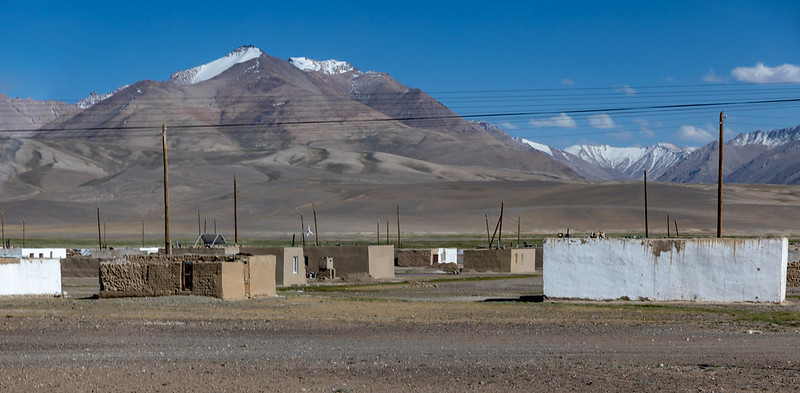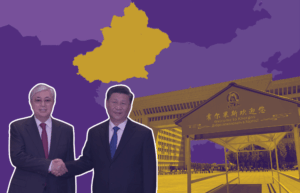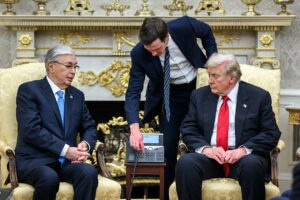Nine human rights defenders are currently imprisoned for their activities in Tajikistan. In an interview with Novastan, UN Rapporteur on Human Rights Defenders, Mary Lawlor, explains the reasons for these imprisonments and the prospects for the defense’s release.
In early July, UN experts issued a release condemned the treatment of human rights defenders in Tajikistan. Often accused of extremism, they are sentenced to long prison terms in unfair trials, if they have not already fled the country.
Mary Lawlor is the United Nations Special Rapporteur on Human Rights Defenders and founder of Front Line Defenders. She was visiting Tajikistan to follow nine cases of imprisonment and meet with human rights defenders in the country. In an interview with Novastan, she explains the current situation in Tajikistan and whether it is possible for those imprisoned to be released.
Novastan: For those who did not follow the situation closely, how would you describe the human rights defender situation in Tajikistan? Who are the imprisoned human rights defenders and what are the reasons of their imprisonment?
Mary Lawlor: I went to Tajikistan on a country visit last November and December. There, I met with human rights defenders, some of them in secret because of the great sense of fear among them. They are afraid that if they speak to anyone, there could be retaliations against them and their family. I also spoke to government officials from various departments.
Human rights defenders there are subjected to completely unfair trials, that are often held in secret. They often don’t have lawyers and the judicial system is not impartial. The trials are unfair. There is also the huge problem of human rights defenders being charged with severely long sentences. The people I have looked at are being charged between 7 and 29 years.
Read more on Novastan: In Tajikistan repression continues
They are being charged and criminalized for their peaceful, legitimate work on behalf of others. Some of the human rights defenders are afraid that their names will be publicly disclosed.
Out of the 9 cases I raised, 8 of them were accused of extremism and terrorism related offenses. This is what happens in Tajikistan: the government uses it as a tactic to give lengthy sentences on false charges to human rights defenders. The government is very concerned about security because of their shared border with Afghanistan and extremism, and I do understand that. But that is no excuse for criminalizing people who are entitled to peacefully defend the rights of others in accordance with international standards to which the government of Tajikistan has agreed.
My concerns are that with these sentences there are awful pre-trial and pre-sentence conditions along with ill treatment. In some cases, there were disappearances when people were first arrested.
Nowadays, who is under threat in Tajikistan? For instance, a relative of one of the imprisoned human rights defenders says everyone who was close to this person or was working with this person have faced charges as well or have left the country.
We have heard that a lot of human rights defenders have gone into exile because they were afraid of facing charges. Some of them have been forcibly returned to Tajikistan. I heard about a human rights defender who had been forcibly returned from Russia. Somebody else was returned from Belarus, though he was not a human rights defender, so that is outside of my mandate.
In the case of Ulfatkhonim Mamadshoeva, I think it’s a particularly awful case. She was doing legitimate work as a journalist and had a history of human rights work. She received a very long sentence (21 years – editor’s note). Her family has been targeted as well. Of course, it rips apart the family.
Read more on Novastan: Tajikistan: one year since the tragic events in the Pamirs
I went to see Daler Imomali and Abdullo Gurbati in the detention center and it was heartbreaking. They are two young bloggers. Daler [Imomali] has a genetic disease from which his brother died and his mother is terrified that he will die too.
Abdullo [Gurbati] was arrested when his first child was one week old. They were devastated, both of them. And the conditions they were being held in, and had been held in, were terrible. The one good thing the Tajik government did was send doctors to give them a full medical examination.
But you can see the effect it has on their families. Abdullo [Gurbati] has never seen his baby and he cried when I met him. And I understand that Daler [Imomali]’s mother is very anxious about the fact that he could get tuberculosis or something like that in prison.
What has evolved this past year? Have you noticed any change since your last report?
No, one human rights defender who cannot be named was released, but that was because he was due amnesty.
What I am really hoping for is that this new agreement the European Union (EU) is negotiating with Tajikistan, the GSP+ (General Scheme of Preferences Plus – editor’s note), will change things. The agreement includes recommendations that I made about the release of human rights defenders, fair trials, and secret trials. I understand that the EU included these recommendations in the negotiations because there can be no serious reason why such low human rights standards cannot be upheld.
I am hoping that this is something the Tajik government will do. They will give pardon or amnesty to the human rights defenders that I’ve raised in my formal letter to them on the basis that they may wish to conclude this agreement. This is of course assuming that the EU stands firm, and that the Tajik government thinks it is better for them to have an agreement with the EU.
There were negotiations about GSP+ last December. A European-Tajik human rights dialogue was held around the same time. Have we seen any results from these meetings?
We all know about human rights dialogues. I usually call them “dialogues of the deaf”. It doesn’t seem to have any influence on the Tajik government. As I said, I’m hoping that perhaps we can move forward with this GSP+ agreement.
I understand that the Tajik government has a few months before the next negotiations with the EU and that they are waiting to see the recommendations in the report that I’m going to be presenting to the UN human rights council in March next year. But I don’t know when that will be public. We have to wait and see.
Read more on Novastan: European reaction to repression in Tajikistan has no effect
I think if the Tajik government moves, it will be on the basis that they are friends with China and Russia. And they would like to be able to point out that they have an agreement with the EU too. But as we know, all the power belongs to the President (Emomali Rahmon, editor’s note) and his office, so it really depends on whether or not the President will agree. The negotiation papers have been moved to the President’s office.
How can the situation improve?
I think total reform is necessary, to be honest. The rule of law, and when I say that I mean the rule of fair law according to international standards, has to change. There needs to be reforms in the judiciary and access for human rights defenders and others to legal assistance. There needs to be more lawyers. A lot of lawyers are either not practicing, leaving, or are banned from practicing because they have been criminalized. That is on the law side.
And corruption needs to be tackled. It’s everywhere, it’s rampant. It’s accepted into society but remember every time somebody gives a bribe or takes a bribe, it means money is being diverted from services that the people so desperately need. So, corruption is a huge issue.
And then, I met so many ministers and officials, but none of them had any power. There isn’t a democracy. There has to be a reform, basically, of the government. But it seems that the President is modeling his self on Turkmenistan. He is hoping to stay there until his son takes over, as a dynasty.
The lack of human rights education for young people is a problem, too. The majority of the population is so young and there is no human rights education in schools. They say there is, but I looked at it. There isn’t. It’s about educating the people so they know their rights and are able to claim their rights.
But the government says: “No, we don’t want to do that, we are afraid of extremism.” I say that if you educate people to human rights, they won’t become extremists. The government would say: “No, look at the West, lots of people from the West joined ISIS.” Some people did join ISIS, it was quite true, but overall, putting in place a culture of respect for human rights is necessary for a country to grow in human rights policies and practices.
They really should recognize that human rights defenders are people who are peacefully defending rights of others in accordance with the Universal Declaration of Human Rights. The Tajik government doesn’t really understand who a human rights defender is. I think they need to start with that and gradually move towards recognizing their credibility. It’s in their interest in the long term.
Interviewed by Nane Bouvier
Editor for Novastan
For more news and analysis from Central Asia, follow us on Twitter, Facebook, Telegram, Linkedin or Instagram.
 Human rights in Tajikistan: Interview with the UN Special Rapporteur
Human rights in Tajikistan: Interview with the UN Special Rapporteur 



